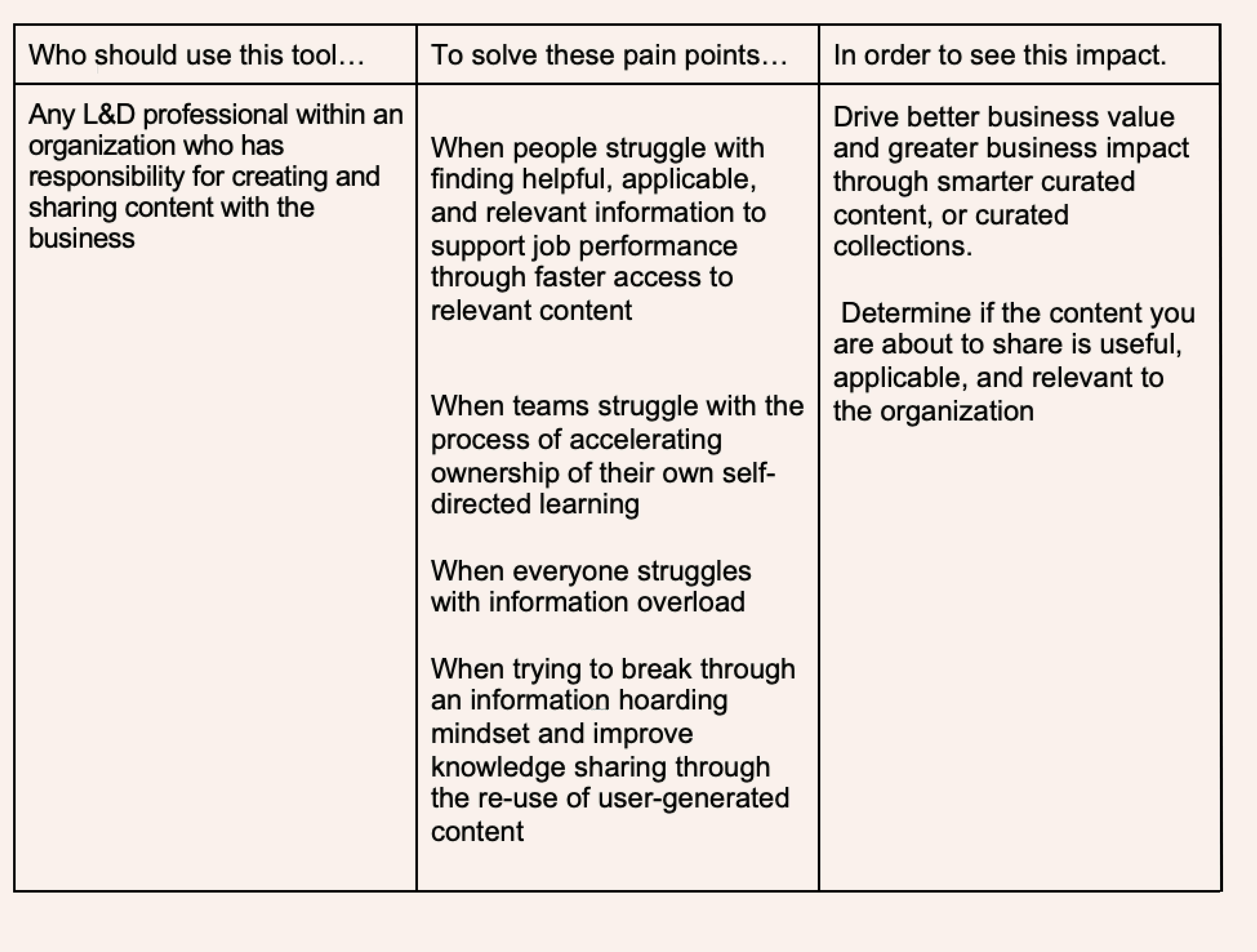
Making it simple to curate with impact

Written by guest blogger Shannon Tipton. Chief Learning Officer of Learning Rebels LLC and co-founder of Emerging Stronger, Shannon's mission is to modernize, upgrade and reimagine workplace learning problems. She believes that by making complex training more interesting, engaging and impactful, training is transformed from being just another organizational event to becoming part of real business solutions.
Over the past year, the Emerging Stronger team has developed a series of tools to make it simple for L&D professionals to embrace evidence-informed tactics to improve business impact. In the second of this series of “Making it Simple to Do the Right Thing”, Shannon Tipton introduces you to the Curation Decision framework.

Curation: Moving beyond aggregation to quality information gathering and sharing
Learning and development professionals have more content available to us than ever before - but can we put our fingers on the information we need, when and where we need it? And, then when and where our businesses need to have it?
Today’s businesses are rapidly requiring that their learning and development teams have relevant, well-organized, and well-displayed digital collections of resources. Resources such as articles, links, videos, graphics, and research so that they can allocate these precious resources to the people who need them the most when they most need to have them.
E. O. Wilson is quoted to have said, “We are drowning in information while starving for wisdom. The world henceforth will be run by synthesizers, people able to put together the right information at the right time, think critically about it, and make important choices wisely.”
Continuing information overload can be cured with thoughtful and deliberate curation. Today’s workplace needs curators who collect, disseminate, and invite others to view "collections" of digital assets.
This post, when worked in conjunction with the Emerging Stronger “Power Hour Tool”, will make it easier for you to help managers share and empower their teams to take ownership of their professional development.
Here we will guide you through using the Curation Decision Framework by supplying you with helpful suggestions as to how best to use the tool.
Here the Emerging Stronger team shares the impact of this tool:
Thoughtful curation, the answer to information silos
An information silo is information held by one group that is not easily or fully accessible by other groups in the same organization. Does this sound familiar? Whether it is your LMS hoarding your vast content library or a team holding onto some breakthrough thinking - information silos suck!
What is the cost of continuing information silos?
- The current view of information becomes limited: Information silos prevent relevant information from being shared. Organizational analysis is limited because secrets are hidden away. There’s no hope of discovering operational inefficiencies or redundancies.
- It’s a waste of resources: When the same information is stored in different places, by different departments and people, there’s a business cost of productivity and separate hard costs of IT data storage.
- Discourages collaborative work: Information silos reinforce silo-driven cultures. Information-driven organizations embrace collaboration to find and leverage new insights. When information is difficult or impossible to share, the ability to collaborate across departments and businesses suffer.
Then there are the hard costs, according to Forbes: “Fortune 500 companies lose at least $31.5 billion a year by failing to share knowledge, according to International Data Corp. (IDC)” (Babcock, 2004, p. 46)
For businesses to thrive in this ever-changing business climate, a culture of curation and knowledge sharing is non-optional.
L&D’s unique position of being the eyes and ears of an organization allows us to get in front of thoughtful curation practices that can propel knowledge sharing forward. To help you with your curation efforts, Emerging Stronger has a framework that can make your curation decisions easier.
Curation Decision Tool overview:
Ideally, this tool would be used before you start resourcing content to share. Your curation decision will consist of three steps:
Part 1 - Accessing “the Right” Content
- The need: What business problem are you trying to solve?
- The audience: Who is the person using the content?
- The application: What should people be able to do with the content?
- The access: How will you share what you find?
- The potential impact: How will you know the content will be useful?
Part 2 – Making the Decision
- How will you decide what to share?
- Is the content fit for purpose?
- Follow-up planning
Part 3: Sharing the content
- Develop your communication plan
- Reduce confusion and frustration around curation efforts
This tool provides guidance notes for each part of your curation journey.
What makes this template useful is that it provides a worked example to show you what a completed template might look like.
All to help make it simple to do the right thing, to help you connect people to resources.
Scaling your curation efforts
Realizing that not everyone is facing the same situations, even within the same organization, how can you use this tool to gain impact?

Next steps
All of this is to help you be the content tour guide in your organization. Connecting people with resources helps them be smarter, better, and faster than they were the day before.
When considering content curation where would you rather find yourself: Ideating, writing, and recreating the wheel? Or, Gathering, disseminating, and clicking “share” on something valuable you recently read?
The road to a winning curation strategy takes a bit of thought and consideration, but overall curating content saves you time and team effort. Curated content helps you remain visible and keeps you adding value to the business and creating impact without additional content creation expenses.
Some L&D tools work just fine on their own, however, others work at their best when combined with other complementary tools. Fertilizer alone works just fine to nourish plants, but when coupled with good soil and mulch the results are ten-fold.
Using this Curation Decision Framework tool alone will help you see the results discussed. Coupled with the Power Hour Tool (See below), it becomes even simpler to do the right thing and see results that increase business impact.
Ready to scale your curation efforts? Download your Curation Decision Tool now!
Other tools in this series
Needs Analysis Tool: It's always good to clarify what’s actually needed to improve performance before jumping into curation & this tool helps.
Curation Decision Tool: Once your needs assessment points you in a specific direction, how can you better curate and disseminate resources and tools?
Communication Launch Tool: Your learning intervention is on its way, how will you communicate and implement its purpose? Just because you build it, doesn’t guarantee success.
Power Hour Tool: Sometimes the biggest barrier to training success is “INSIDE.THE.HOUSE”. The Power Hour tool can help you bring managers into the discussion sooner and enable them to be part of the learning process.
Workplace Communities Tool: Perhaps your analysis tells you it’s not more learning required but a connection to the community. This tool helps identify workplace communities with fertile ground and how to take action to help learning thrive.
Improving Impact Tool: Your needs analysis sets you up for success, the improving impact took keeps you on track to deliver.
You may also be interested in the other blogs in this series:
Making it simple to conduct a needs analysis conversation, where Shannon Tipton covers delivering valuable content with the Needs Analysis Tool.
Making it simple to engage with managers, Laura Overton talks through improving engagement with managers with The Power Hour Tool.
Making it simple to market learning and increase engagementMaking it simple to market learning and increase engagement, with Laura Overton exploring how to best spread the word on your learning solution with the Communication Plan Launch Tool.
Making it simple to improve impact, Laura Overton walks through a powerful and adaptive resource, the Improving Impact Tool.
Making it simple to cultivate learning in workplace communities, where Shannon Tipton presents ways to empower the communities at play with the Cultivating Learning Tool.
For more insights, subscribe to the Go1 newsletter to stay on top of all the latest L&D trends. Or, you can book a demo today to find out how Go1 can help with your team’s learning needs




